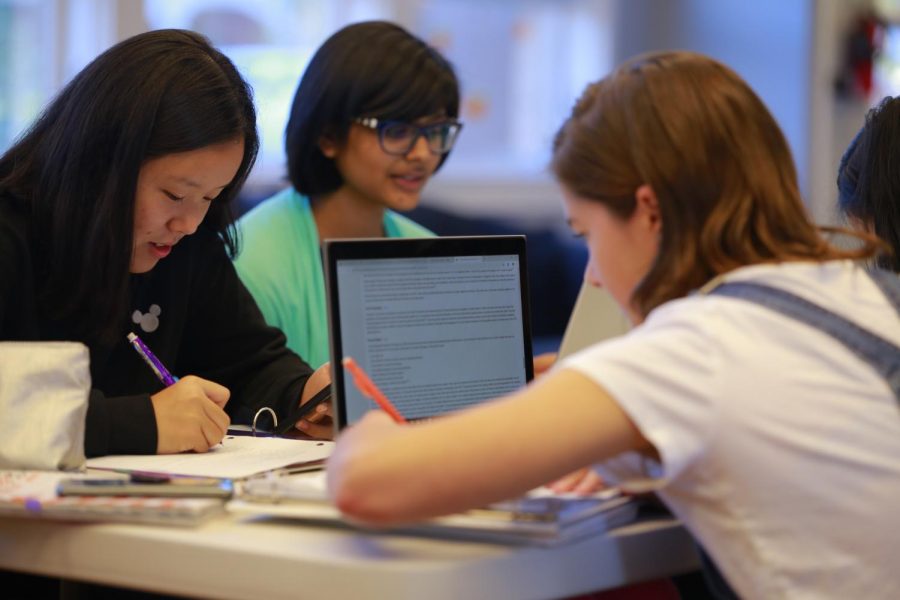To Fit in, or Not Fit in
ACHIEVE MORE! There is no way to eliminate peer pressure from the lives of teenagers today. Like any other concept, it can have both positive and negative impacts so it is up to high schoolers to determine just how peer pressure influences their decisions. Thankfully at IHS, students agree that the culture motivates them to pursue academic excellence.
December 7, 2018
As students, we sometimes spend more time around friends than our own parents. It is not uncommon to find close friends who share similar thought processes, employ the same speech patterns and phrases, and participate in the same activities.
Young adults lead lives based on important choices that need to be made on a daily basis. The choice to be healthy, to pursue higher education, to go for the gold, and to attempt higher academic success. These challenging decisions are hard enough without the added pressures of friends, classmates, and other commitments. Peer pressure, as defined by junior John Morse, is “When people around you at your level in society push you to do things you don’t want to do.” It is the infamous influence from classmates and media that is more often than not viewed as the major detriment to decision making for teens.
Painting peer pressure in a bad light is often depicted on TV and in movies of going to raging school parties and cutting class. Junior Delaney Callan brings up the stereotypical example of “trying to get your friends to do drugs,” as seen in movies like “Pulp Fiction” and TV shows like “Lucifer.” According to Sober College, peer pressure is a huge factor in substance abuse development and is only aided by the media that portrays drugs as a way of gaining acceptance or popularity.
There are many other ways that peer pressure can negatively affect us. Magazines portraying the ideal body type only influence negative self-perception and can lead individuals to strive for beauty in unhealthy ways. Sophomore Hailey Hilliard recognizes the “unrealistic ways of how people should look and act” as seen in popular magazines. Photoshop and set scenes allow celebrities to be portrayed as the epitome of perfection and lead young adults to go to unhealthy measures to achieve the same beauty. According to The Destruction of Beauty, “Doing drugs, getting cosmetic surgery, starving yourself, and other unhealthy habits are becoming more and more popular in young adults,” in response to media portrayals of teenagers on their quest to fit in and be popular. On social media, seeing classmates wearing the newest shoes or the trendiest clothes can lead students to feel like they have to put out perfect pictures of their best selves to gain as many followers as their peers.
However, peer pressure can also be seen as beneficial to students. Freshman Gabrielle Inman says that her friends “pushed [her] to [want] be a better person at IHS.” Seeing others take harder classes and challenging themselves to achieve academic success can be contagious, leading to a mutual drive to be better students. The wide range of classes, extracurriculars and fun activities that our school offers allows students to try things they never have before in a safe and encouraging environment. Senior Shaylee Brockmeier has been positively impacted by peer pressure at IHS with her “friends urging [her] to branch out and make new experiences.” Encouraging classmates to step out of their comfort zones and try out for sports or participate in theatre is positive peer pressure that fosters a community where students are comfortable trying new things and pursuing success in ways that are not the norm.
While media can negatively influence young adults, it also has the power to do the opposite. In movies, relatable characters like the intelligent, driven Hermione Granger from the Harry Potter series and the brave, responsible Peter Parker from the Spider-man movies, can push us to succeed and exemplify the same positive characteristics they do. Magazine articles exemplifying the ordinary aspects of celebrities’ lives and describing their rise to success and personal struggles can help teens better identify with the real people behind the glitz and the glam. Songs like “Intuition” by Selena Gomez and “Glorious” by Macklemore about overcoming adversity and rising above present situations to prosper can influence students to do the same and look past current pressures to try new things and face challenges with open minds.
Peer pressure is a powerful tool that can hinder academic success and impact health, but it can also be used to facilitate positive change at Issaquah High School. It is important to be mindful about how we use it because that determines whether or not it makes or breaks us.




